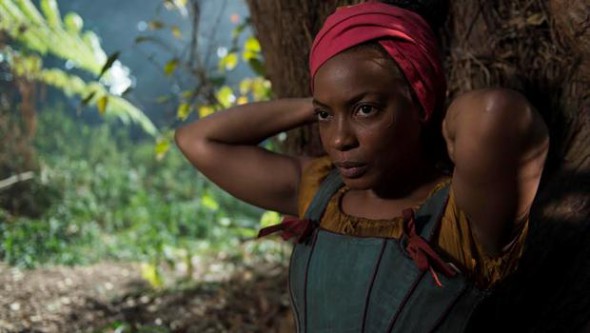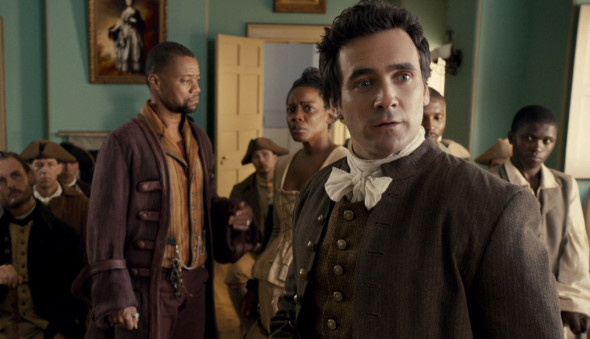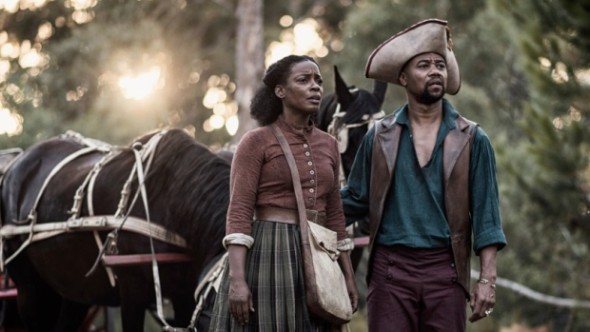
The Book of Negroes (DVD) – Series Review
The Book of Negroes is a miniseries based on the novel by Lawrence Hill. It tells the story of Aminata Diallo, who is enslaved and brought to America. It’s the beginning of a hard life, but she will fight: fight to live, to be free, to have a better life, not only for her, but for all the other slaves as well. All she really wants is to return to her home. Although it won’t be simple, with war already lurking around the corner, she just keeps in mind the words her father once told her: ‘find your way home, Aminata’.
Aminata’s (Aunjanue Ellis)story starts off in 1761in an African village named Bayo. Aminata is eleven years old and fills her days accompanying her mother, who is a midwife. When on their way to help a woman in a neighboring village, Aminata and her parents get ambushed by human traffickers. They cold-bloodedly kill her parents, and force Aminata to undertake a long journey to the sea on foot, chained up together with hundreds of other captives. They undertake a long voyage ‘across the big river’, to South Carolina. While on this journey she meets Chekura (Lyriq Bent), and they become good friends. But once they arrive in America, they are sold as slaves to different masters, and Aminata is alone once again. She is bought by Robertson Appleby (Greg Bryk), who owns an Indigo plantation. She works for him for many years, and becomes a pretty young woman. But Appleby noticed that too, and he rapes her. Meanwhile, Chekura finds her again, and they secretly marry. But after giving birth to their baby daughter, Appleby sells the child and soon sells Aminata as well. Her new owners, mister Lindo (Allan Hawco) and his wife (Amy Louise Wilson), are much more kindhearted people. When Rosa Lindo and her little son die of smallpox, mister Lindo decides to go to New York. Aminata comes with him, but after she finds out that he had something to do with the sale of her daughter, all she wants to do is escape to be free, and maybe one day return to her home village. When the revolution breaks out in New York, she seizes the opportunity and finds refuge in a neighborhood called Canvas Town. There she enters in the footsteps of her mother, and also finds a job at the local inn. She’s safe for now, but soon she’ll have to run again.
History and fiction are mixed up in this story, but it is still a very strong tale. Aminata has to overcome so many hardships, but never gives up, and always tries to find ways to make things better for her and her peers. Sometimes, definitely at the beginning, the story gets quite cruel. It makes you think about society in the 18th century, and how lucky we are to have been born in this day and age. It often seems as if all misfortune falls upon Aminata: the enslavement, the rape, the sale of her daughter are all traumatic events, but still, she keeps her head up high. Luckily, every now and then there is a feel good moment to lift your spirits again.
The pace of this six-piece miniseries is very fast. There is so much story to tell, that all of the episodes are really cramped with information. Each episode lasts a good forty minutes, but it almost feels as if you watched an entire movie. Because almost no time has been wasted to more trivial scenes, you will have to stay focused during the whole episode. That being said, the story is very interesting and really makes you want to stay tuned for more.
Aunjanue Ellis’ rendition of Aminata Diallo is absolutely stunning. She shows a wide range of emotions, going from sadness when she’s at Appleby’s ranch, to total despair when she finds out that he sold her baby, to happiness when she is finally reunited with Chekura, to determination to find a better life. She really is the star of the show, although, truth be told, the many supporting actors did a great job as well. Also Shailyn Pierre-Dixon did a marvelous job in episode one, as the young Aminata. We will certainly hear from her again.
The music adds greatly to the overall feel of the series. It is never overpowering, but manages to set the mood very well. Together with the rather grim color scheme, it portrays a dark period, where a lot of injustice was done, and war is not far off.
Conclusion
The Book of Negroes is a fascinating story about slavery in the 18th century. Although it mixes history with fiction, it still gives you a proper idea of how life was back then. Although Aminata’s story is a rather extraordinary one, it is clear that the life of a slave must have been very hard. The outstanding acting performances only add to that feeling of authenticity, and will probably keep you hooked from the beginning until the very end.








No Comments